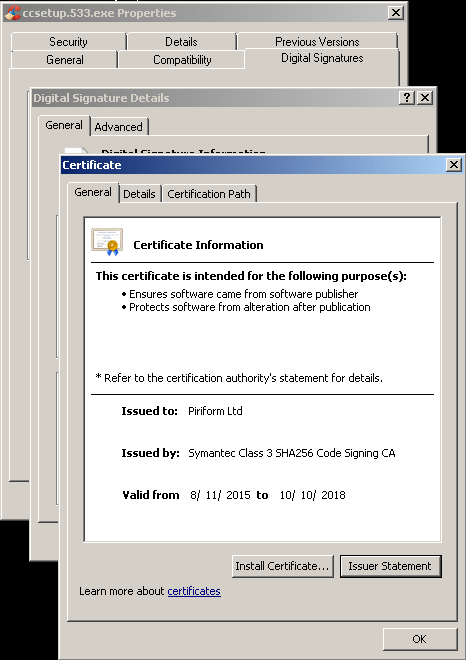

- CCLEANER PIRIFORM MALWARE INSTALL
- CCLEANER PIRIFORM MALWARE UPDATE
- CCLEANER PIRIFORM MALWARE SOFTWARE
- CCLEANER PIRIFORM MALWARE CODE
- CCLEANER PIRIFORM MALWARE SERIES
This is over concern that Russian owned Kaspersky is in collusion with the Kremlin and conducts espionage. The confusion of trust is perhaps most effectively highlighted by the US Government’s contentious ban on its government computer networks using the afore mentioned Kaspersky Labs cybersecurity software.

We are now firmly in new territory, a place where we cannot trust those trying to protect us. So, the hackers are targeting the trusted sources.
CCLEANER PIRIFORM MALWARE CODE
Talos researcher Craig Williams said, “The nature of the attack code suggests that the hacker won access to a machine used to create CCleaner”.
CCLEANER PIRIFORM MALWARE INSTALL
Only install applications from a trusted source.”. Time and time again we hear the mantra ‘Don’t download from an untrusted sender. A confusion of trustįor years, avoiding malware was relatively straightforward, use the latest malware detection software, don’t click on dodgy links on the web, and don’t open file attachments from unknown email senders. This approach circumvents any malware detection mechanisms on the end users’ devices. And since CCleaner is a trusted application, no end of scans for malware and viruses would have detected it. If the hackers can find a soft spot in security, they insert the malicious code and then wait for the updates containing it to be rolled out to users.

CCLEANER PIRIFORM MALWARE SOFTWARE
The problem for users, and the industry alike, is that malware has been placed inside of a legitimate and very popular software program, and in this case, belonging to one of the world’s foremost cybersecurity firms. The backdoor was closed before it was used, fortunate since hundreds of companies worldwide including banks and energy providers use the software. In August, Kaspersky Labs uncovered malware which created a backdoor into enterprise management tools distributed by South Korean firm Netsarang.
CCLEANER PIRIFORM MALWARE UPDATE
The ‘Petya’ ransomware attack earlier in the year involved malicious code distributed via a software update for M.E.Doc, a popular tax software in Ukraine. Whereas hackers have previously occupied themselves on individual users, now they are increasingly targeting systems further up the supply chain and using software vendors’ distribution infrastructure to spread malware.
CCLEANER PIRIFORM MALWARE SERIES
The hack is the latest in a series of ‘supply chain’ attacks and highlights the evolution of cybercrime. Latest in a series of supply chain attacks In addition, they have failed to credit the third parties who uncovered and alerted them to the compromised software. Piriform’s parent company Avast is facing criticism however, nothing appeared on its Twitter feed for twelve hours and there are no announcements on its website. The intentions of those who hacked CCleaner’s code are unclear and it seems the code was detected and deleted before it was used. However, users of the software may have been vulnerable for up to a month. Upon uncovering the malicious code on September 12th, Piriform released a clean version of CCleaner the same day, with CCleaner Cloud following on September 15th. The software does not update automatically and Piriform recommends a clean install following a virus scan. The company indicated that 3% of its users downloaded the affected software, and suggest that all users of CCleaner visit this link and download the latest, clean version. Piriform have posted an in-depth description of the specifics of the malware on their website. The incident potentially enabled unauthorized access to some 2.27 million devices. These copies of the software included malicious code inserting a backdoor through which further code could be downloaded from a remote server and run on the infected computer, without user consent. The downloads affected were those released on August 15th and August 24th for Piriform’s CCleaner and CCleaner Cloud. A backdoor enabled hackers access to 2.27 million devices In addition, it includes tools to reconfigure startup procedures and, in the update in question, a remote access tool. The software cleans up computers by deleting temporary internet files, cookies and obsolete files from a device. CCleaner is a free multi-platform program (Windows, Android, Mac OS) used by up to 130 million people worldwide.


 0 kommentar(er)
0 kommentar(er)
